US surgeon general says national mask mandate isn't necessary
From CNN's Jason Hoffman
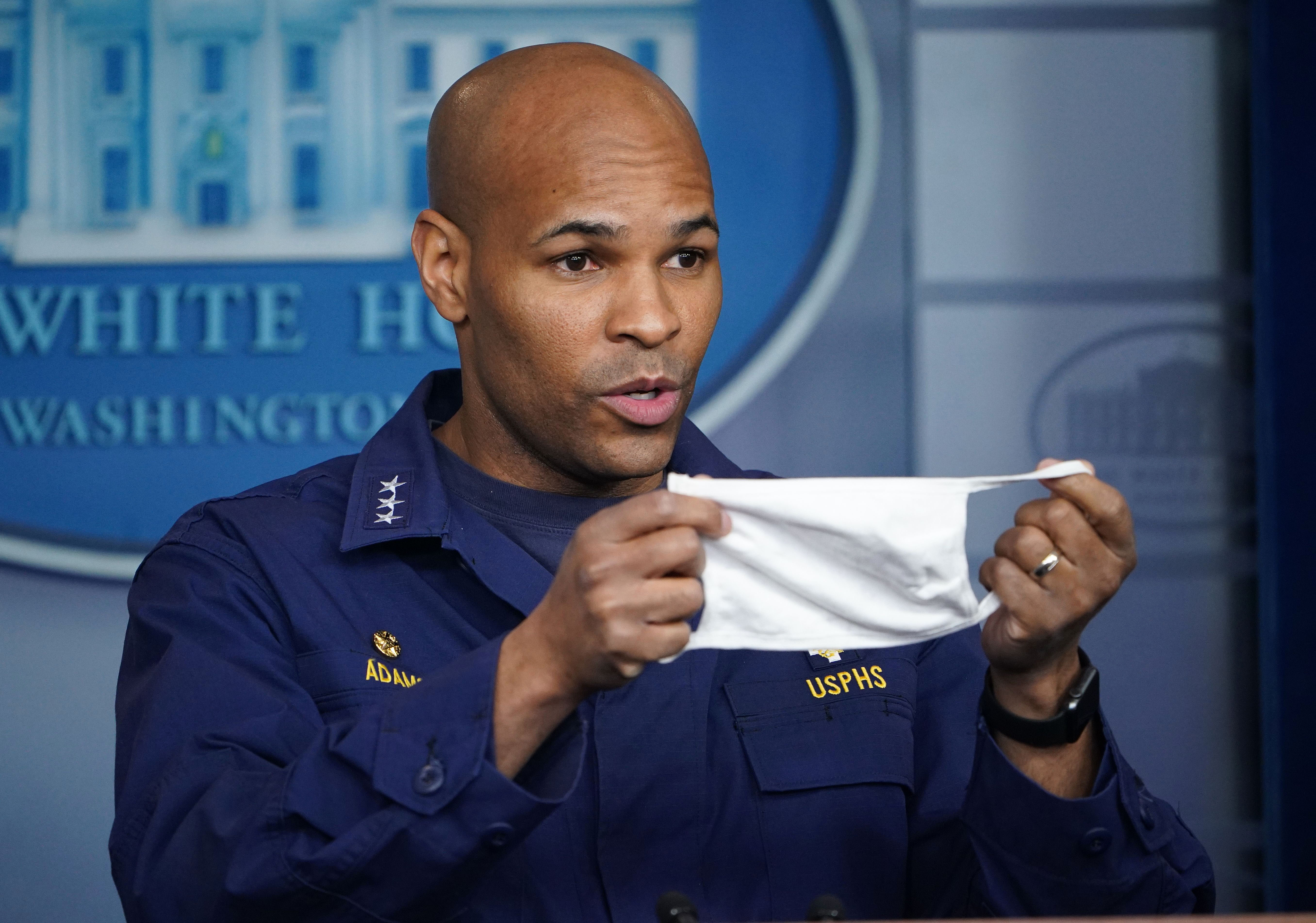 US Surgeon General Jerome Adams holds a face mask during a coronavirus briefing at the White House on April 22. Mandel Ngan/AFP/Getty Images
US Surgeon General Jerome Adams holds a face mask during a coronavirus briefing at the White House on April 22. Mandel Ngan/AFP/Getty ImagesSurgeon General Jerome Adams echoed President Trump, saying he does not think a national mask mandate is necessary, but at the same time urged all Americans to continue to wear face coverings.
Asked about a national mask mandate, Adams said “in many cases we are letting the politics and the policy get in the way of the actual practice.” Adams said that the science shows that wearing masks will allow for America to reopen and stay open sooner.
The surgeon general said he believes a mandate would work better at a local and state level than a federal level because if there was a federal mandate, there would need to be a way for the federal government to enforce it.
“If you are going to have a federal mandate you have to have a federal enforcement mechanism and right now as scientist and an educator, I would rather help people understand why they should cooperate with wearing a mask and how they benefit from it, versus just simply saying we are going to force you to do it, particularly by sending in federal troops or using federal mechanisms,” Adams said.
What Trump has said: In an interview with Fox that aired Sunday, President Trump said he does not feel a national mask mandate is necessary because he wants people to “have a certain freedom”
Trump said over the weekend that he does not believe the disease will go away if everyone wears masks.
It's just past 1 p.m. in London and 8 a.m. in New York. Here's what you need to know
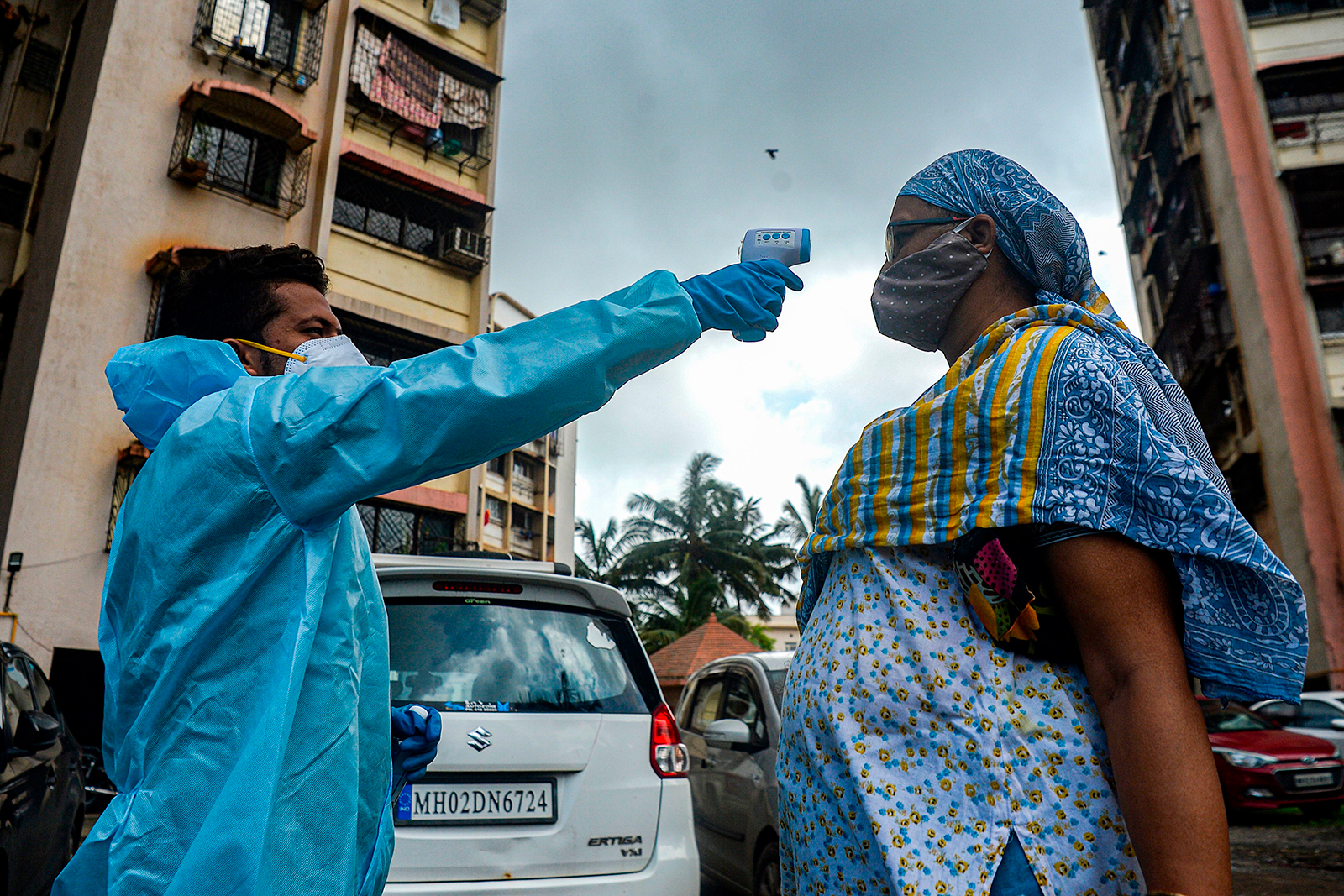 A health worker, left, takes the temperature of a resident during a door-to-door medical screening drive in Mumbai on Monday, July 20. Indranil Mukherjee/AFP/Getty Images
A health worker, left, takes the temperature of a resident during a door-to-door medical screening drive in Mumbai on Monday, July 20. Indranil Mukherjee/AFP/Getty ImagesThe novel coronavirus has infected 14.5 million people worldwide and killed at least 606,000, according to the Johns Hopkins University tally. Here's the latest on the Covid-19 pandemic.
India cases surge: The country has recorded 40,425 new virus cases in the past 24 hours, the highest daily increase since the outbreak began.
Brazil's leader greets supporters despite being positive for Covid-19: Jair Bolsonaro took a walk on the grounds of his presidential palace Sunday and greeted crowds despite his diagnosis. Supporters were separated from the President by a small water canal, but two people crossed over to his side. One man helped another, who appeared to have a physical disability, walk close to the President for a greeting.
Hong Kong reports 73 new cases Monday: City officials are struggling to get new outbreaks under control. Among 66 locally transmitted cases, 27 were untraceable.
Demonstrators protest mask law in London: Hundreds of people gathered in the city on Sunday to protest against the wearing of face masks, days before it becomes mandatory to wear them in stores in England.
Xinjiang capital in "wartime" lockdown: A "wartime" state has been declared in the capital of Xinjiang, home to China's persecuted Muslim-majority Uyghur ethnic group, after 17 local infections were recorded on Sunday.
China's $9-billion movie box office is reopening after six months of shutdown
From CNN Business' Jill Disis and Shanshan Wang
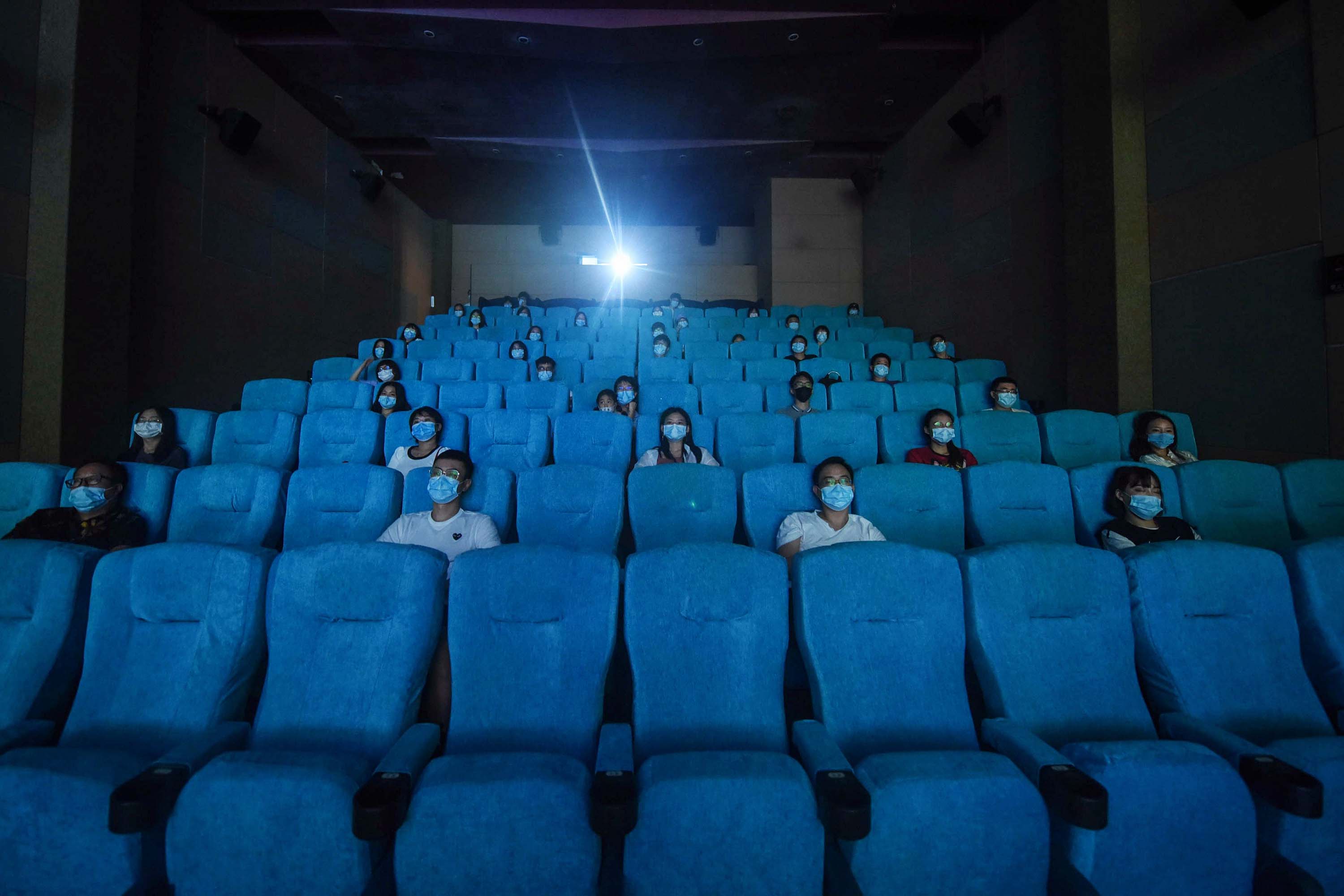 People watch a movie as they sit socially-distanced at a cinema in Hangzhou, China, on July 20. Stringer/AFP/Getty Images
People watch a movie as they sit socially-distanced at a cinema in Hangzhou, China, on July 20. Stringer/AFP/Getty ImagesChina's massive box office began to reopen on Monday after the coronavirus pandemic spurred a shutdown lasting roughly six months.
The China Film Administration announced late last week that movie theaters in "low-risk" areas could reopen from Monday with a few precautions. Audience members are required to wear masks and take temperature checks, and cinemas are expected to operate at 30% capacity. Eating and drinking in the theater is also prohibited.
The "low-risk" requirement effectively means that most of the country should be able to reopen cinemas, according to the Global Times, a state-run tabloid.
Ticket sales for Monday's box office surpassed 2.8 million yuan ($400,000) just before 5 pm local time, according to Maoyan, a major Chinese ticketing platform.
The Chinese film "A First Farewell," about a boy from Xinjiang, along with the 2017 Pixar film "Coco" and the Chinese thriller "Sheep Without A Shepherd" grossed the most in pre-sales, according to the Global Times.
China is home to a huge movie industry that generated more than $9 billion in box office sales last year — second only to the United States.
Hundreds of demonstrators, some wearing masks, protest against mask-wearing in London
From CNN's Rob Picheta
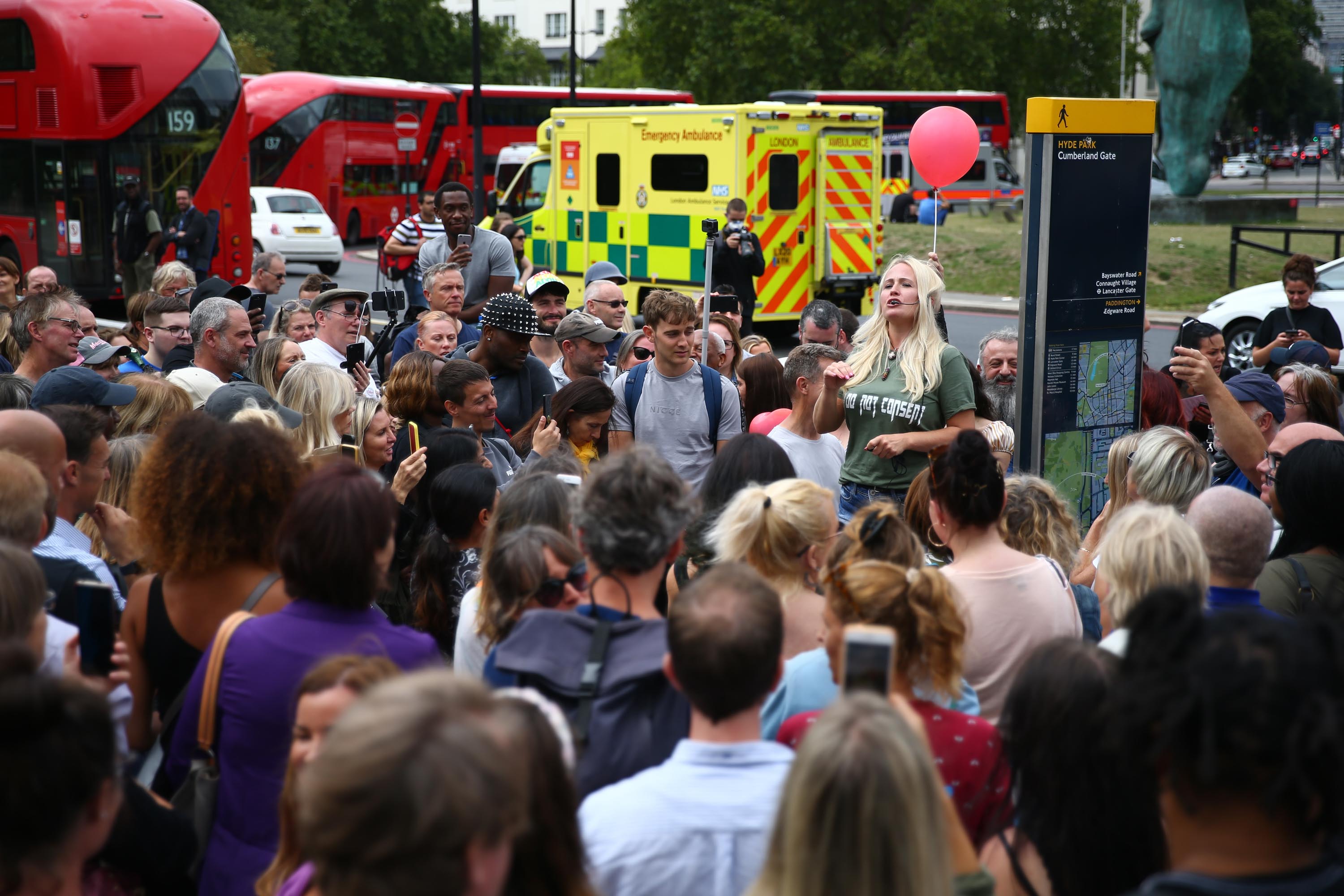 'Cassie Sunshine' speaks during the Keep Britain Free movement anti-mask protest in London on July 19. Hollie Adams/Getty Images
'Cassie Sunshine' speaks during the Keep Britain Free movement anti-mask protest in London on July 19. Hollie Adams/Getty ImagesHundreds of demonstrators gathered in London on Sunday to protest against the wearing of face masks, days before it becomes mandatory to wear face coverings in stores in England.
A small crowd descended on Hyde Park in central London to voice their opposition to masks after Prime Minister Boris Johnson announced it will become compulsory to wear them in shops from Friday.
Some protesters waved placards referring to masks as "mind control" devices, while others were pictured promoting baseless conspiracy theories including the flat earth theory and a supposed link between 5G and Covid-19. Several demonstrators wore masks to illustrate their opposition to face masks.
The gathering was organized by a group called Keep Britain Free, which claims on its website to support: "Freedom of speech, choice and thought."
A number of studies have found that the coronavirus spreads mainly via airborne transmission and wearing a mask is the most effective way to stop person-to-person spread.
Hong Kong reports another 73 new Covid-19 cases
From Vanesse Chan
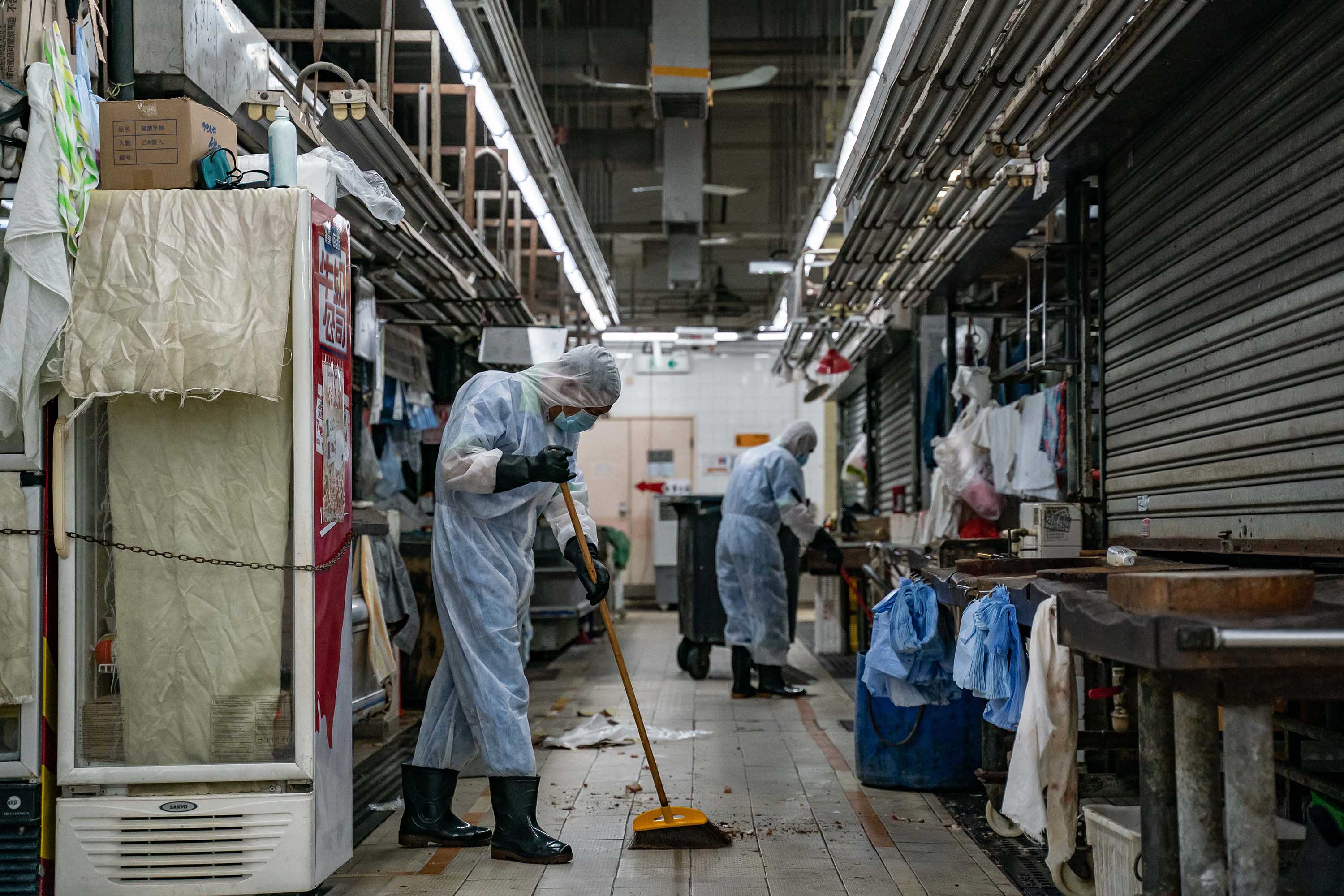 Workers clean and disinfect a wet market in Hong Kong on July 19. Anthony Kwan/Getty Images
Workers clean and disinfect a wet market in Hong Kong on July 19. Anthony Kwan/Getty ImagesHong Kong reported 73 new coronavirus cases on Monday, seven of which were imported, bringing the city's tally to 1,958, health officials said.
Among the 66 locally transmitted cases, 27 were untraceable.
The newly confirmed cases are mainly related to previous cluster outbreaks in the city. Two of the new cases were linked to a large birthday party, one case was linked to an outbreak centered on a clinic and more were recorded in the city's Tsz Wan Shan neighborhood.
Twenty-four of the new cases were transmitted between family members.
Cases are rising sharply in Hong Kong, which recorded more than 170 cases over the last weekend.
Dr. Chuang Shuk-kwan of the Centre for Health Protection said officials needed a few more days to understand the trend in numbers.
“We cannot judge the trend according to one or two days' factors because there's an incubation period. And what we see now refers to what happens in the past one to two weeks,” Chuang said.
She added that if cases continued to rise, more stringent measures for epidemic control will be enforced.
Over the weekend, Hong Kong’s leader Carrie Lam extended social distancing measures and announced non-essential civil servants will be required to work from home.
French President Macron "slammed his fist on the table" during tense EU talks on virus recovery fund
From CNN's Pierre Bairin
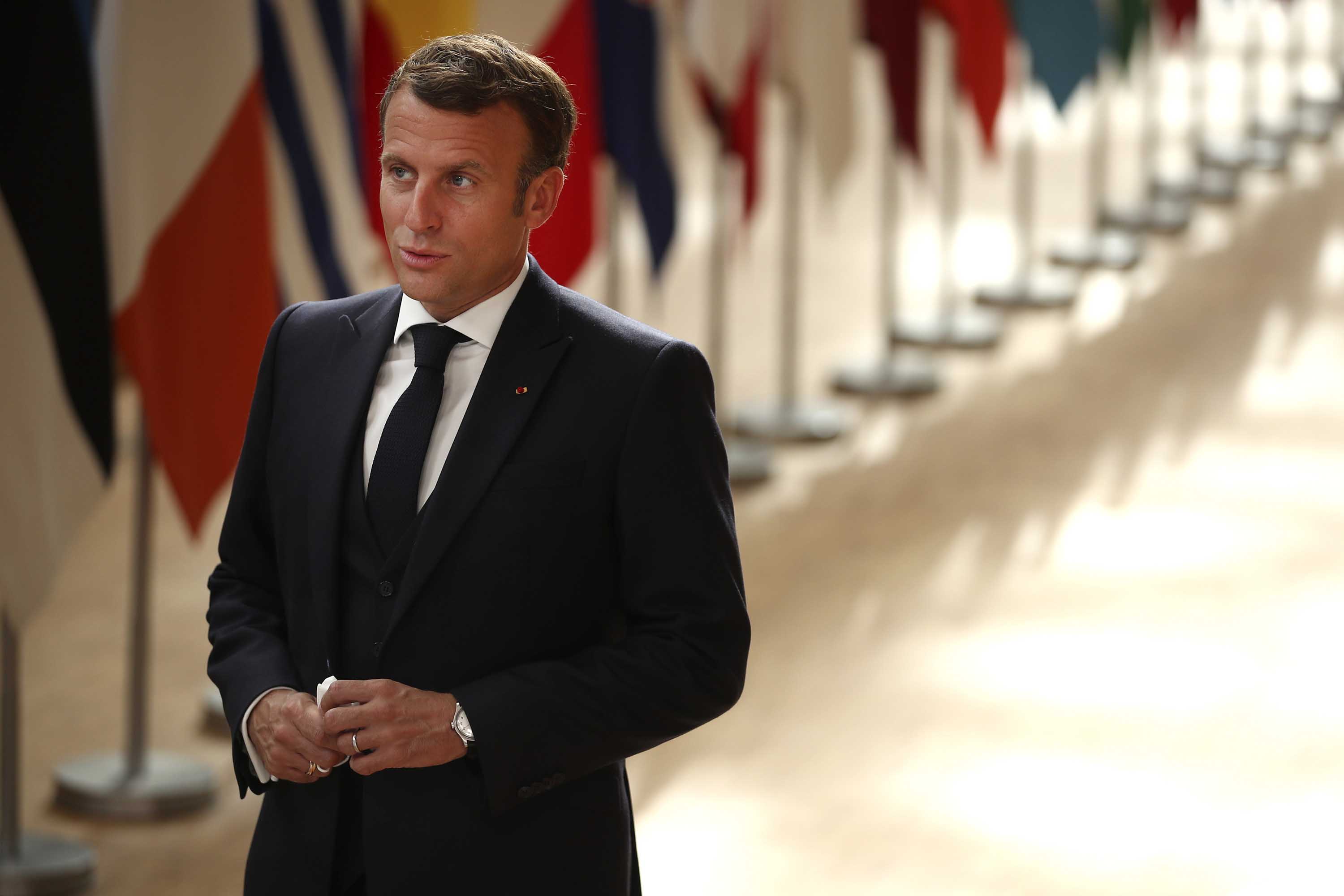 French President Emmanuel Macron makes a statement as he arrives for an EU summit at the European Council building in Brussels, Belgium, on July 19. Francisco Seco/Pool/AFP/Getty Images
French President Emmanuel Macron makes a statement as he arrives for an EU summit at the European Council building in Brussels, Belgium, on July 19. Francisco Seco/Pool/AFP/Getty ImagesFrench President Emanuel Macron "slammed his fist on the table" in anger during crunch overnight talks on the EU coronavirus recovery fund, French officials told CNN.
The officials said there had been a "tough moment last night" as European leaders struggle to reach an agreement on the recovery plan after three days of talks.
The bloc's members have so far failed to reach a deal.
At the center of discussions is a proposal put forward by the European Commission in May. That plan would see the Commission raise €750 billion ($857 billion) on financial markets, alongside the regular EU budget for 2021-27.
Under that plan, two-thirds of the recovery funds would be distributed to countries via grants, while the remainder would be offered as loans.
But Austria, Netherlands, Denmark and Sweden -- the so-called "frugal" countries - opposed the idea of issuing grants and now want strict conditions attached to them.
France and Germany have worked together to "mobilize their partners for an agreement" French officials said, with Macron and German Chancellor Angela Merkel doing "everything to bring the most reluctant countries to agree to €400 billion ($450bn) [in subsidies]."
The officials claimed that after the Franco-German intervention the "frugal" countries started to "budge slightly," and that there was now an avenue open for a possible agreement.
A short plenary session was held at 5:30 a.m. local time in Brussels (11:30 p.m. ET Sunday) and a new proposal will be presented at 4 p.m. in Belgium (10 a.m. ET) on Monday, French officials said.
Xinjiang capital in "wartime" lockdown over spike in cases
From CNN's Nectar Gan
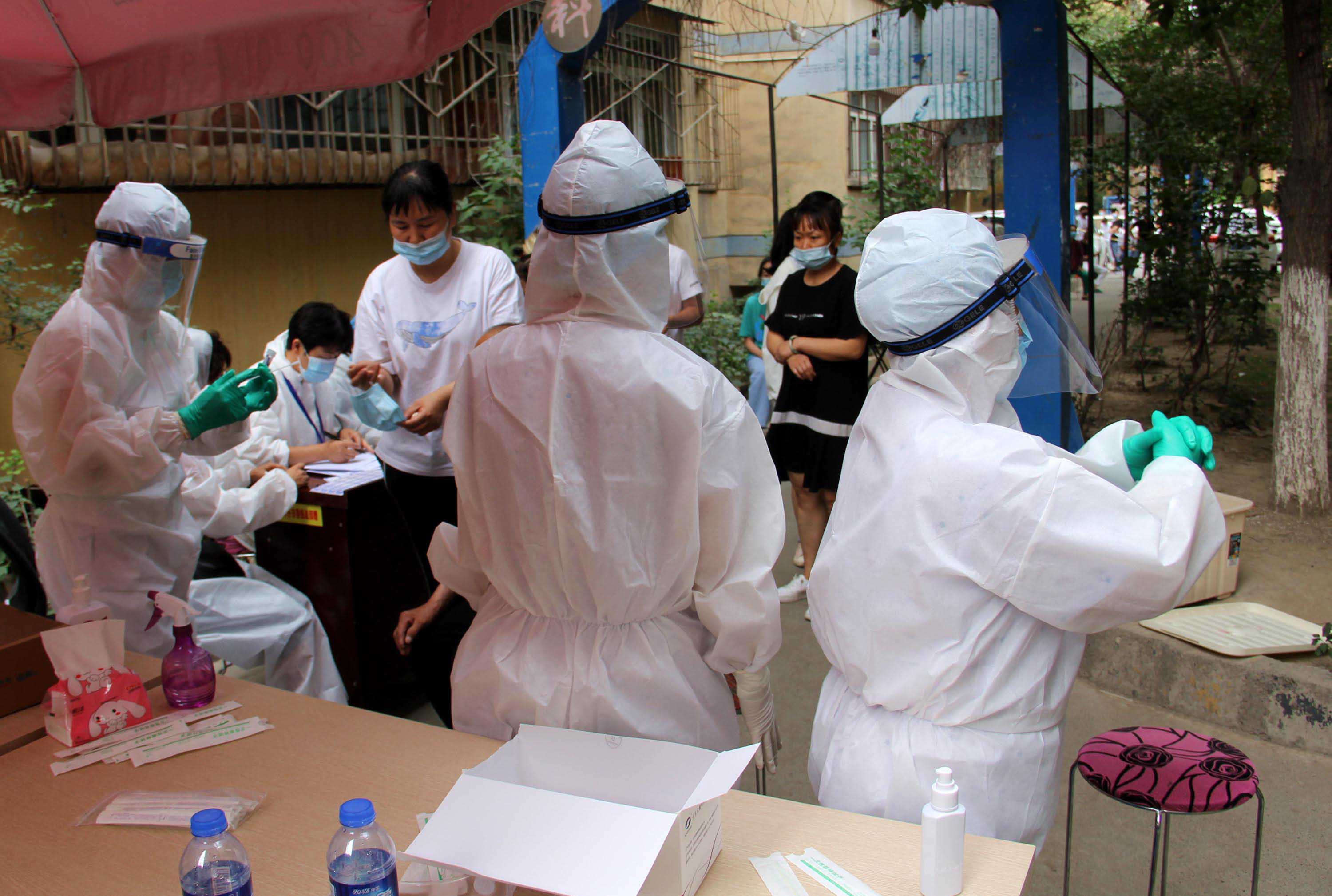 Residents undergo nucleic acid testing in Urumqi, in the Xinjiang Uyghur Autonomous Region of China, on July 19. Shi Yujiang/China News Service/Getty Images
Residents undergo nucleic acid testing in Urumqi, in the Xinjiang Uyghur Autonomous Region of China, on July 19. Shi Yujiang/China News Service/Getty ImagesA "wartime" state has been declared in the capital of Xinjiang, home to China's persecuted Muslim-majority Uyghur ethnic group, as authorities implement strict and sweeping measures to stem a spike in coronavirus cases.
The city of Urumqi reported 17 local infections Sunday, meaning that 47 cases have been identified since last Wednesday. Before that, it had not recorded a single case in nearly five months, according to the Xinjiang health authorities.
Since last week, Urumqi has also recorded 50 asymptomatic cases. In China, these are not considered confirmed cases under government guidelines.
To stop the outbreak escalating, authorities are now implementing the so-called Beijing model.
UK government admits test and trace program does not meet privacy rules
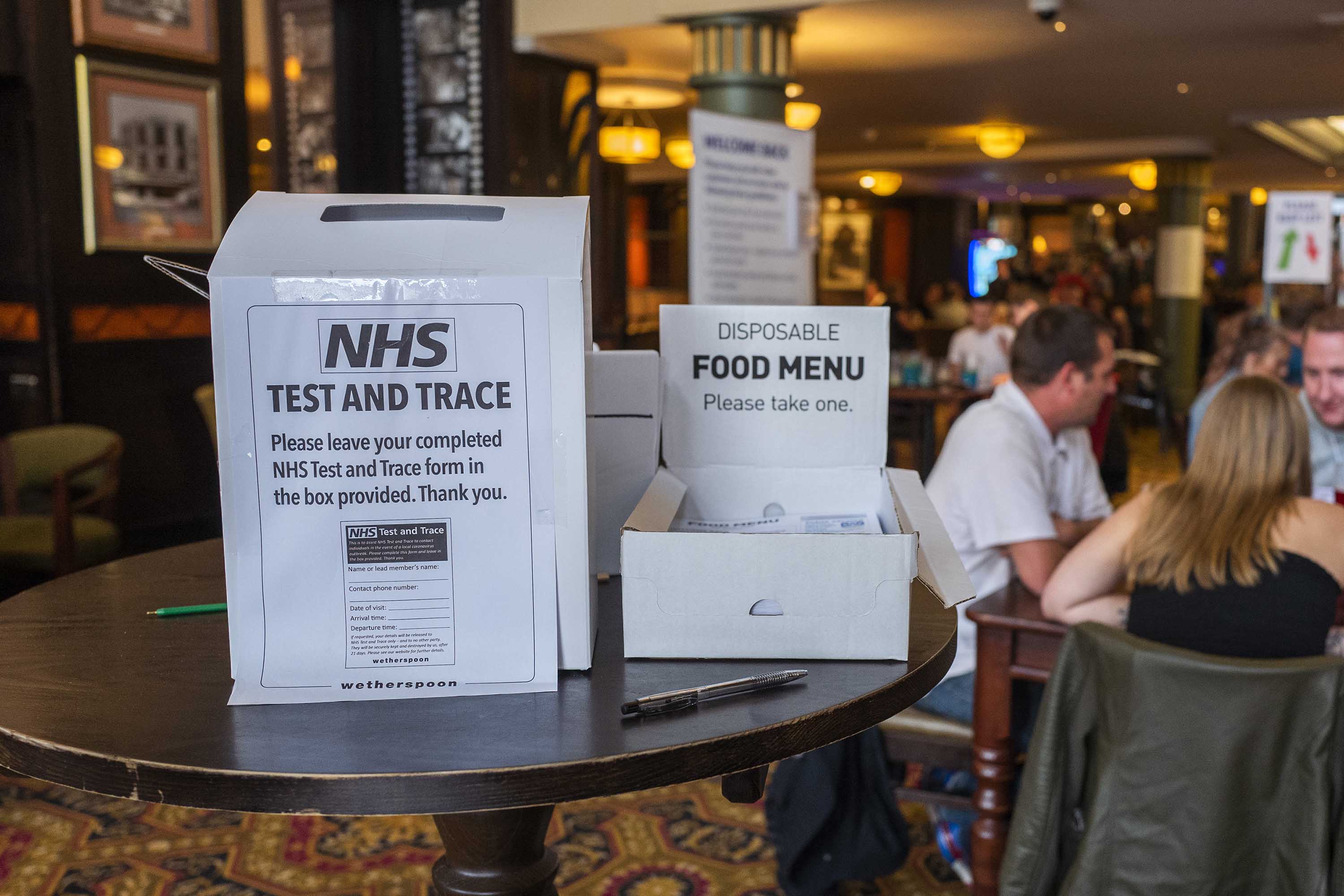 Britain's National Health Service Test and Trace form is displayed at the entrance of a pub in Rochdale, England, on July 4. Anthony Devlin/Getty Images
Britain's National Health Service Test and Trace form is displayed at the entrance of a pub in Rochdale, England, on July 4. Anthony Devlin/Getty ImagesThe UK government has admitted that it launched its Covid-19 test and trace program without complying with a key aspect of data protection law.
Under British law, officials were required to conduct a Data Protection Impact Assessment (DPIA) before launching the program on May 28, but failed to do so.
The impact assessment is a "legal requirement for any type of processing, including certain specified types of processing that are likely to result in a high risk to the rights and freedoms of individuals," according to the UK's information commissioner's office.
The UK Department of Health made the admission in a letter to the privacy campaigning organization Open Rights Group (ORG).
The government also maintains that there is no evidence that the information that has been collected has been used unlawfully.
ORG had threatened to proceed with legal action over the breach.
In the letter, dated July 15, the government conceded that the assessment was required and had not been in place when the test and trace scheme was launched.
"Such a DPIA is currently being finalised, drawing on the extensive data protection compliance work," the letter says.
"We have a ‘world beating’ unlawful Test and Trace programme. A crucial element in the fight against the pandemic is mutual trust between the public and the government, which is undermined by their operating the programme without basic privacy safeguards. The government bears responsibility for the public health consequences."
A Department of Health spokesperson said: “There is no evidence of data being used unlawfully. NHS Test and Trace is committed to the highest ethical and data governance standards -- collecting, using, and retaining data to fight the virus and save lives, while taking full account of all relevant legal obligations."
“We have rapidly created a large scale test and trace system in response to this unprecedented pandemic. The programme is able to offer a test to anyone who needs one and trace the contacts of those who test positive, to stop the spread of the virus.”
Why North Korea says it's joining the coronavirus vaccine race, even though it has no cases
Analysis from CNN's Joshua Berlinger
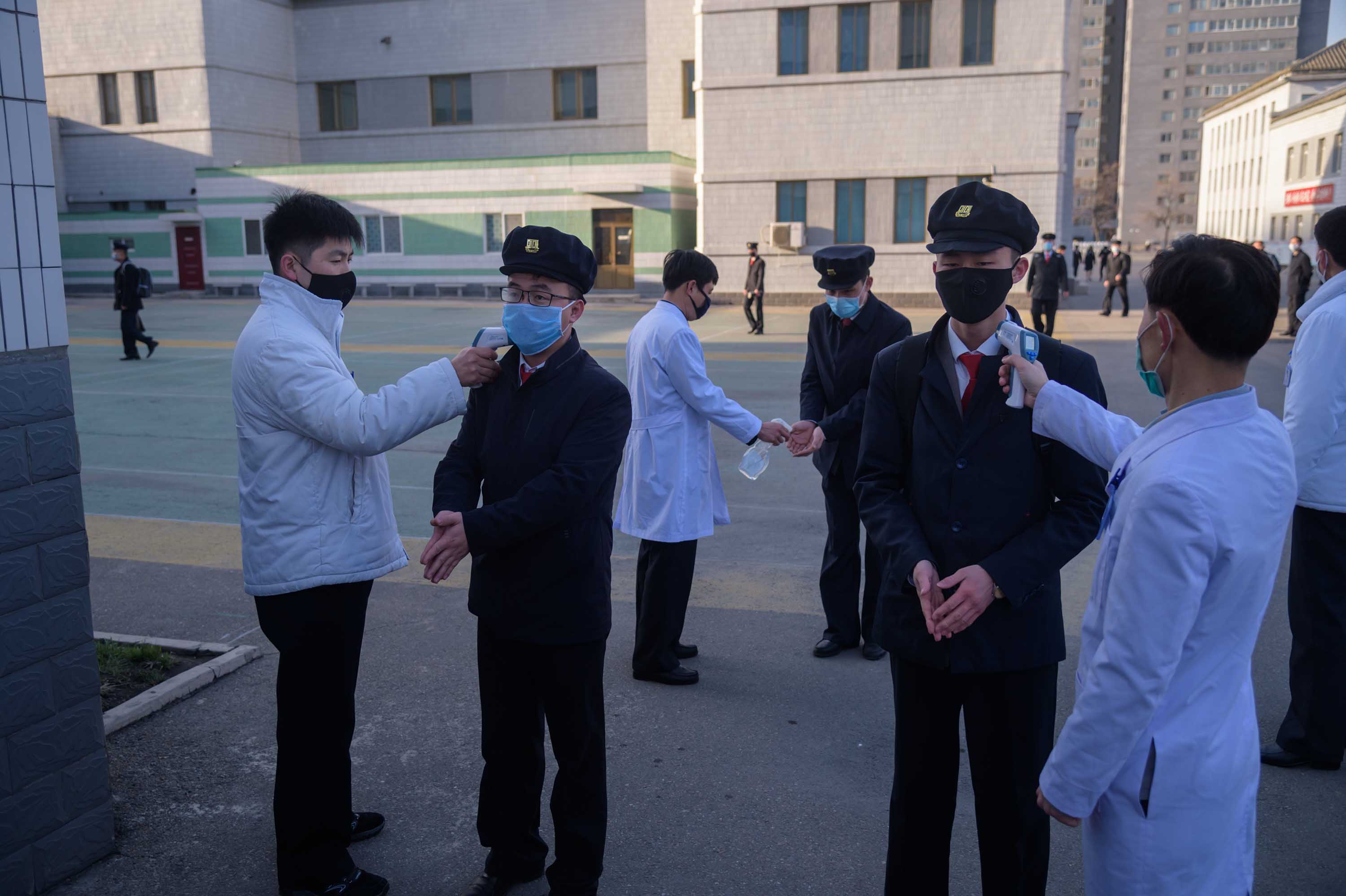 Students wearing face masks disinfect their hands and undergo a temperature check as they arrive for a lecture on preventative measures against coronavirus at the Pyongyang University of Medicine in Pyongyang, North Korea, on April 22. Kim Won Jin/AFP/Getty Images
Students wearing face masks disinfect their hands and undergo a temperature check as they arrive for a lecture on preventative measures against coronavirus at the Pyongyang University of Medicine in Pyongyang, North Korea, on April 22. Kim Won Jin/AFP/Getty ImagesNorth Korea says it is joining the race to develop a Covid-19 vaccine, a global contest that has already drafted in some of the world's best medical minds and is shaping up to cost billions of dollars.
Just don't expect it to take the lead anytime soon.
If North Korea's State Commission of Science and Technology is to be believed, clinical trials for the country's domestic vaccine candidate are already underway -- and a debate is now happening about how to proceed with the third phase, which involves human testing.
To the outside world, the claim could appear dubious.
The race to develop a vaccine for a disease that has infected nearly 14.5 million people and killed more than 605,000 globally is one of the most daunting and pressing technological and scientific challenges the world has faced in recent memory. It will likely cost huge sums of money, and nations are investing heavily to win what's shaping up to become a competition of scientific superiority and national pride.
Yet North Korea has one of the most dilapidated health care systems on the planet, and for decades it has relied on assistance from the World Health Organization to supply its people with vaccines and immunizations. Then there's the fact that Pyongyang has not publicly admitted to any infections inside the country.

 5 years ago
592
5 years ago
592 

